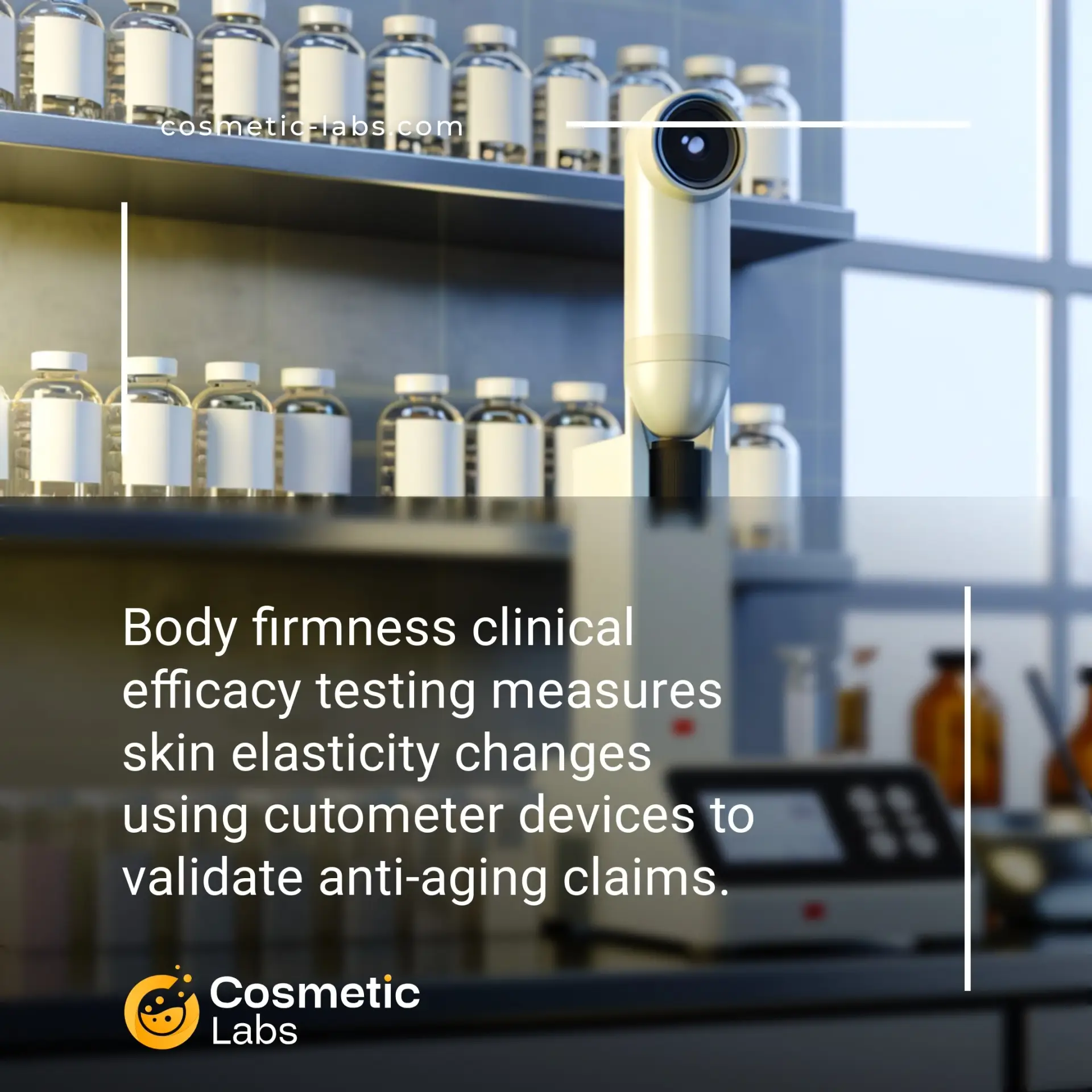Body Firming Clinical Testing Services For Cosmetic Brands

What is Body firmness efficacy testing?
Body firmness clinical efficacy testing services measure how well anti-aging and firming products actually tighten skin through controlled human studies. Labs use cutometry and ultrasound imaging to quantify skin elasticity changes before and after product application, typically over 28-84 day periods. These tests provide the scientific data brands need for marketing claims like “improves skin firmness by 15%” while meeting regulatory requirements for substantiation.
Why do you need this service?
Cosmetic brands rely on body firming efficacy testing to validate claims for anti-cellulite creams, lifting serums, and contouring treatments before launch. Our platform connects you with labs that measure skin elasticity, firmness parameters, and visual improvements using standardized protocols, delivering documented proof for marketing claims that satisfy regulatory requirements and consumer expectations.
Who provides Body firmness efficacy testing services?
All cosmetic labs providing Body firmness efficacy testing services
There is no company providing these services at the moment.
Body Firmness Clinical Efficacy Testing Services
Body firmness testing validates your anti-aging and skin-tightening formulations through precise dermatological measurements. Labs on our platform use advanced cutometry and biomechanical analysis to demonstrate measurable improvements in skin elasticity, tone, and firmness parameters.
Cutometry and Biomechanical Assessment
Professional testing facilities measure skin firmness changes using cutometry devices that apply controlled suction to skin surfaces. These instruments quantify elasticity parameters including immediate deformation, delayed distension, and biological elasticity ratios. Labs typically run 4-8 week studies with 20-30 participants to establish statistical significance.
Testing protocols include:
- Baseline measurements on untreated control areas
- Weekly cutometry readings at standardized body sites
- Photo documentation of visible firmness improvements
- Statistical analysis of elasticity coefficient changes
Clinical Study Design and Validation
Labs structure body firmness studies around specific claim substantiation requirements for your target markets. Double-blind protocols with placebo controls provide regulatory-compliant data for marketing claims. Testing typically focuses on areas like arms, thighs, and abdomen where firmness changes are most measurable.
Study parameters include participant demographics, application frequency, and measurement intervals. Labs also conduct consumer perception studies alongside instrumental testing to capture subjective firmness improvements that support your marketing messaging.
Connect with verified testing laboratories through our platform to discuss your specific body firmness validation needs and study design requirements.
Real-World Applications of Body Firmness Clinical Efficacy Testing
Beauty brands rely on body firmness clinical efficacy testing applications to validate product claims and secure regulatory approvals across global markets.
Anti-Aging Body Care Product Development
Labs measure skin elasticity using cutometry and biomechanical analysis to prove firming benefits in body lotions and serums. Clinical studies track measurable improvements in skin tightness over 4-12 week periods using standardized protocols.
Testing protocols include ultrasound imaging to measure dermal thickness changes and tensile strength assessments. Results demonstrate percentage improvements in skin firmness, typically ranging from 15-40% after 8 weeks of product use.
| Testing Method | Measurement Focus | Timeline | Typical Results |
|---|---|---|---|
| Cutometry | Skin elasticity | 4-8 weeks | 20-35% improvement |
| Ultrasound imaging | Dermal thickness | 8-12 weeks | 15-25% increase |
| Tensile strength | Skin resistance | 6-10 weeks | 18-30% enhancement |
Post-Pregnancy and Weight Loss Market Positioning
Specialized testing validates claims for products targeting skin laxity after pregnancy or weight fluctuations. Labs use 3D body scanning technology and photographic documentation to track visible improvements in problem areas like abdomen, thighs, and arms.
Clinical protocols measure circumference changes and visual assessment scores from dermatologist evaluations. These studies generate compelling before-and-after data that supports marketing claims and builds consumer confidence in product effectiveness.
Ready to validate your body firming formulations? Connect with experienced cosmetic labs on our platform to design custom efficacy testing protocols that meet your specific product claims and regulatory requirements.
